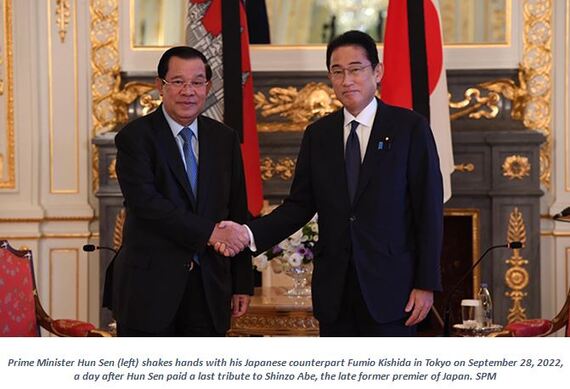In the ever-evolving landscape of international relations, Cambodia's strategic partnership with Japan has played a significant role in shaping the country's development and progress. As the Indo-Pacific era dawns upon us, it becomes crucial to navigate the challenges and opportunities that lie ahead and sustain the strong bond between these two nations.
Cambodia and Japan have maintained a diplomatic relationship that spans over six decades. Japan has been a key player in supporting Cambodia's post-war reconstruction efforts, providing aid, investment, and technical assistance in various sectors. Over the years, this partnership has grown stronger, encompassing areas such as infrastructure development, trade, education, and cultural exchange.
One of the key factors driving Cambodia's deepening relationship with Japan is the shared commitment to peace, stability, and economic prosperity in the region. Japan's role as a major economic powerhouse in Asia has allowed it to become a crucial investor and trade partner for Cambodia. Likewise, Cambodia's strategic location in the Indo-Pacific region presents immense opportunities for Japanese businesses to expand their presence and tap into new markets.
However, sustaining Cambodia's relations with Japan in the Indo-Pacific era will not be without its challenges. As geopolitical dynamics shift and new regional frameworks emerge, it becomes imperative for both countries to adapt and align their interests. This includes addressing issues such as trade imbalances, enhancing connectivity, and fostering people-to-people exchanges.
Furthermore, the complex regional dynamics in the Indo-Pacific region, including the rise of China and the evolving role of the United States, add another layer of complexity to Cambodia's relations with Japan. Balancing these relationships while safeguarding national interests will require astute diplomatic maneuvering and strategic decision-making.
Japan has long been a significant partner for Cambodia, providing extensive economic assistance, investment, and technical support across various sectors. In recent years, Japan's role in the region has expanded with its vision of a free and open Indo-Pacific, emphasizing principles such as the rule of law, open markets, and connectivity.
For Cambodia, this partnership with Japan offers immense opportunities for economic growth, infrastructure development, and human resource capacity building. Japan's expertise in areas such as technology, manufacturing, and sustainable energy can greatly contribute to Cambodia's development goals and aspirations.
Moreover, the strong bilateral relations between Cambodia and Japan also hold strategic significance in the context of the broader Indo-Pacific region. As the region experiences increasing geopolitical competition and power dynamics, nurturing a stable and cooperative relationship between these two countries can contribute to regional peace, security, and economic prosperity.
Cambodia's strategic location in the heart of the Indo-Pacific further enhances the importance of its relations with Japan. As a gateway linking Southeast Asia with East Asia, Cambodia offers Japan a valuable connection to regional markets, supply chains, and trade routes. This symbiotic relationship can facilitate greater regional integration and cooperation, fostering stability and shared benefits.
One of the key areas where Japan has made substantial contributions is in infrastructure development. Through various initiatives and projects, Japan has actively supported Cambodia in improving its transportation networks, energy infrastructure, and urban development. The construction of bridges, roads, and ports has not only enhanced connectivity within Cambodia but also facilitated regional integration and trade. This development assistance has been instrumental in boosting Cambodia's economic growth and attracting foreign investment.
Sustaining strong and fruitful relations between Cambodia and Japan in the Indo-Pacific era is not without its challenges. While the two countries have enjoyed a long-standing friendship and cooperation, there are several factors that pose obstacles to the continued growth and development of their relationship.
As Cambodia navigates the challenges of sustaining its relations with Japan in the Indo-Pacific era, one key aspect to consider is the delicate task of balancing its relations with other regional powers. In a rapidly evolving geopolitical landscape, Cambodia finds itself in a position where it must carefully manage its engagements with various countries to safeguard its own interests and maintain stability in the region.
Cambodia must be mindful of the geopolitical dynamics at play in the Indo-Pacific region. The region is witnessing a power struggle between China and Japan, with both countries competing for influence and asserting their strategic interests. As a small nation caught in the midst of this rivalry, Cambodia needs to adopt a pragmatic and diplomatic approach that allows it to benefit from both countries' engagement while avoiding being drawn into any conflict.
Cambodia can seek to deepen its relations with Japan, which serves as a key strategic partner in the region. Japan's commitment to the principles of a free and open Indo-Pacific aligns with Cambodia's aspirations for a rules-based international order. By strengthening economic cooperation, people-to-people exchanges, and security partnerships with Japan, Cambodia can diversify its external relations and reduce its dependence on any single power.
In conclusion, managing China's influence in the region is a critical challenge for Cambodia as it navigates its relations with Japan in the Indo-Pacific era. By adopting a pragmatic and diplomatic approach, leveraging regional organizations, and deepening ties with Japan, Cambodia can strive for sustained economic growth and strategic autonomy while avoiding being overly dependent on any single power.
-----------------------
Dr. Seun Sam is a policy analyst of the Royal Academy of Cambodia. All views in this article are his own.
